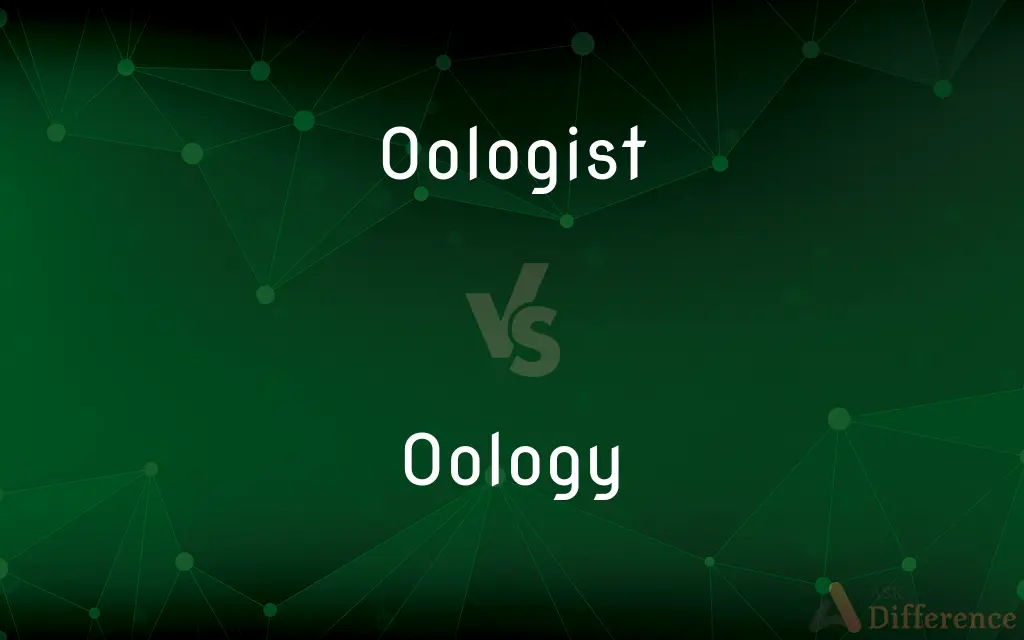Oologist vs. Oology — What's the Difference?
By Tayyaba Rehman & Fiza Rafique — Updated on May 19, 2024
Oologist refers to a person who studies or collects eggs, especially bird eggs, while oology is the scientific study of eggs, focusing on their structure, formation, and classification.

Difference Between Oologist and Oology
Table of Contents
ADVERTISEMENT
Key Differences
Oologist is a noun that designates an individual who specializes in the study or collection of eggs, particularly bird eggs. This term highlights the person involved in the practice or hobby. On the other hand, oology is a noun representing the branch of ornithology that deals with the scientific study of eggs. It encompasses the analysis of egg characteristics, formation, and categorization.
An oologist may work in various settings, including museums, universities, or in the field, focusing on the practical aspects of egg collection and documentation. In contrast, oology involves more theoretical and systematic approaches to understanding eggs, such as researching their development and evolutionary significance.
Oologists often contribute to oology by collecting specimens that can be used for scientific study. They provide valuable data and samples that oologists analyze to further the scientific understanding of eggs. Whereas, oology relies on the contributions of oologists and incorporates broader scientific methodologies to examine and interpret the data.
While an oologist may engage in hands-on activities such as fieldwork and specimen collection, oology involves both fieldwork and laboratory analysis, requiring a more extensive scientific background. This distinction underscores the practical versus theoretical nature of the terms.
Oologists might share their findings through publications or exhibitions, focusing on the significance of specific egg collections. Oology, however, aims to disseminate knowledge through academic research and studies, contributing to the broader field of biology and ornithology.
ADVERTISEMENT
Comparison Chart
Definition
A person who studies or collects eggs, especially bird eggs.
The scientific study of eggs, particularly their structure and formation.
Focus
Practical aspects of egg collection and documentation.
Theoretical and systematic study of eggs.
Activities
Fieldwork, specimen collection, documentation.
Research, analysis, and classification.
Contribution
Provides specimens and data for scientific study.
Analyzes and interprets data for scientific knowledge.
Settings
Museums, universities, fieldwork.
Academic research, laboratories.
Compare with Definitions
Oologist
An individual who collects eggs for scientific or personal interest.
As an oologist, she has an impressive collection of exotic eggs.
Oology
A field within ornithology focusing on eggs.
Oology helps explain evolutionary traits in birds.
Oologist
A scientist contributing to the field of oology.
The oologist published a paper on egg incubation methods.
Oology
The classification and analysis of eggs.
Oology involves detailed classification of various egg types.
Oologist
A person specializing in the study of bird eggs.
The oologist carefully cataloged the rare bird eggs.
Oology
The branch of science dedicated to the study of eggs.
Oology provides insights into the reproductive habits of birds.
Oologist
Someone involved in documenting egg characteristics.
The oologist noted the unique patterns on the eggshells.
Oology
The examination of egg formation and structure.
Through oology, researchers understand how eggshells form.
Oologist
A researcher focusing on the conservation of bird eggs.
The oologist’s work is crucial for protecting endangered species.
Oology
The scientific research of egg development.
Advances in oology have led to better conservation strategies.
Oologist
The branch of zoology that deals with eggs, especially birds' eggs.
Oology
Oology (or oölogy) is a branch of ornithology studying bird eggs, nests and breeding behaviour. The word is derived from the Greek oion, meaning egg.
Oologist
A person who studies or specializes in oology
Oology
The branch of zoology that deals with eggs, especially birds' eggs.
Oologist
One versed in oölogy.
Oology
(ornithology) The study of birds' eggs.
Oology
The hobby or practice of collecting birds' eggs, especially those of wild birds.
Oology
The science of eggs in relation to their coloring, size, shape, and number.
Common Curiosities
How does oology contribute to biology?
Oology provides critical insights into reproductive biology, evolution, and species conservation.
Is oology a part of ornithology?
Yes, oology is a specialized branch of ornithology that deals specifically with the study of eggs.
What kind of research is involved in oology?
Oology involves research on egg formation, structural analysis, and evolutionary significance.
Do oologists conduct fieldwork?
Yes, oologists often conduct fieldwork to collect and study eggs in their natural habitats.
Is egg collection legal for oologists?
Egg collection is regulated, and oologists must adhere to legal guidelines to collect eggs for study.
What is the main focus of oology?
Oology focuses on the scientific study of eggs, including their structure, formation, and classification.
How do oologists help in conservation?
By studying and documenting eggs, oologists provide data crucial for the conservation of endangered species.
What does an oologist do?
An oologist studies and collects bird eggs, often documenting their characteristics and contributing to conservation efforts.
Can an oologist work in a museum?
Yes, oologists often work in museums, where they curate and study egg collections.
Are there specific tools that oologists use?
Oologists use tools such as calipers, magnifying glasses, and cameras to study and document eggs.
How does technology impact oology?
Advances in technology, such as imaging and genetic analysis, enhance the study and understanding of eggs in oology.
Can an oologist publish their findings?
Yes, oologists often publish their research in scientific journals and contribute to academic knowledge.
What is the importance of egg classification in oology?
Classification helps in understanding the diversity and evolutionary relationships among bird species.
What settings do oologists work in besides museums?
Oologists can work in universities, research institutions, and in the field for conservation projects.
What academic background is needed for oology?
Oology typically requires a background in biology, particularly ornithology, and specialized training in egg study.
Share Your Discovery

Previous Comparison
Constant vs. Incessant
Next Comparison
Pot vs. RaftAuthor Spotlight
Written by
Tayyaba RehmanTayyaba Rehman is a distinguished writer, currently serving as a primary contributor to askdifference.com. As a researcher in semantics and etymology, Tayyaba's passion for the complexity of languages and their distinctions has found a perfect home on the platform. Tayyaba delves into the intricacies of language, distinguishing between commonly confused words and phrases, thereby providing clarity for readers worldwide.
Co-written by
Fiza RafiqueFiza Rafique is a skilled content writer at AskDifference.com, where she meticulously refines and enhances written pieces. Drawing from her vast editorial expertise, Fiza ensures clarity, accuracy, and precision in every article. Passionate about language, she continually seeks to elevate the quality of content for readers worldwide.













































